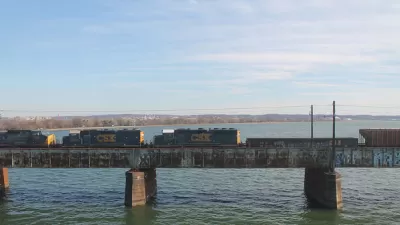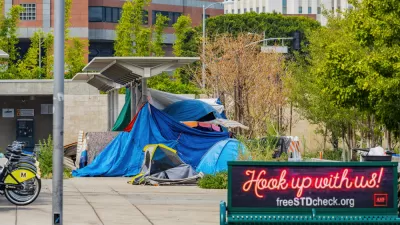Even as extensions to the Gold Line and Measure S seem to paint a brighter future for public transit in Los Angeles, commuters continue to use less public transit, especially buses.

"Since 2009, Metro has opened four new rail extensions at a cost of more than $4 billion. In the same period, rail ridership soared 21%, but bus trips — a much larger share of overall ridership — dropped 18%," writes Laura J. Nelson for the Los Angeles Times.
The reasons for the shrinking use of transit are multiple, according to Nelson's reporting. One is the complexity of serving a city with so many different commerce centers, which requires compromises in bus service. "But tweaks over the years to routes and schedules may have eroded the efficiency of some workhorse bus lines that serve major corridors, or made the routes more confusing for riders," Nelson writes. Nelson also reports that some transit experts see falling bus ridership as a side effect of an improving economy. "As L.A.’s economy has steadily improved, traffic has grown worse, and so has Metro’s on-time performance. Agency figures show that about 76% of buses arrived on time in the 2014 fiscal year." Ride sharing services may be partly to blame as well.
One reason for the decline in bus ridership Nelson does not cite is zoning and density. There's been much talk about how although L.A.'s downtown is becoming more popular, it's hard to build large dense transit-friendly buildings in the city. This phenomenon is noticeable by how few cranes you see in the city's downtown compared to even smaller, slower-growing cities like Chicago. Density continues to be on the minds of many as Measure S and the possibility of stalling the construction of more and taller residential and business buildings looms.
FULL STORY: The Metro can take you farther than ever. Here's why ridership dropped — again

Planetizen Federal Action Tracker
A weekly monitor of how Trump’s orders and actions are impacting planners and planning in America.

Congressman Proposes Bill to Rename DC Metro “Trump Train”
The Make Autorail Great Again Act would withhold federal funding to the system until the Washington Metropolitan Area Transit Authority (WMATA), rebrands as the Washington Metropolitan Authority for Greater Access (WMAGA).

DARTSpace Platform Streamlines Dallas TOD Application Process
The Dallas transit agency hopes a shorter permitting timeline will boost transit-oriented development around rail stations.

Renters Now Outnumber Homeowners in Over 200 US Suburbs
High housing costs in city centers and the new-found flexibility offered by remote work are pushing more renters to suburban areas.

The Tiny, Adorable $7,000 Car Turning Japan Onto EVs
The single seat Mibot charges from a regular plug as quickly as an iPad, and is about half the price of an average EV.

Supreme Court Ruling in Pipeline Case Guts Federal Environmental Law
The decision limits the scope of a federal law that mandates extensive environmental impact reviews of energy, infrastructure, and transportation projects.
Urban Design for Planners 1: Software Tools
This six-course series explores essential urban design concepts using open source software and equips planners with the tools they need to participate fully in the urban design process.
Planning for Universal Design
Learn the tools for implementing Universal Design in planning regulations.
Municipality of Princeton
Roanoke Valley-Alleghany Regional Commission
City of Mt Shasta
City of Camden Redevelopment Agency
City of Astoria
Transportation Research & Education Center (TREC) at Portland State University
US High Speed Rail Association
City of Camden Redevelopment Agency
Municipality of Princeton (NJ)





























